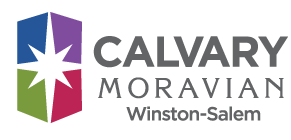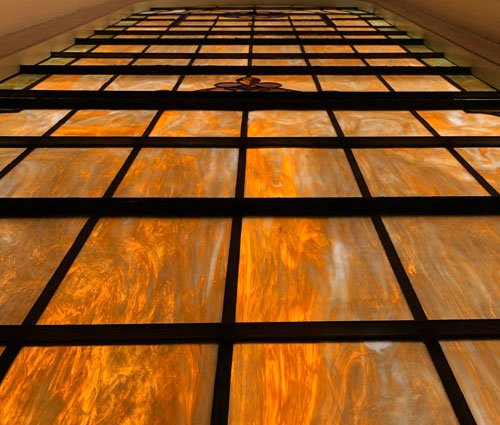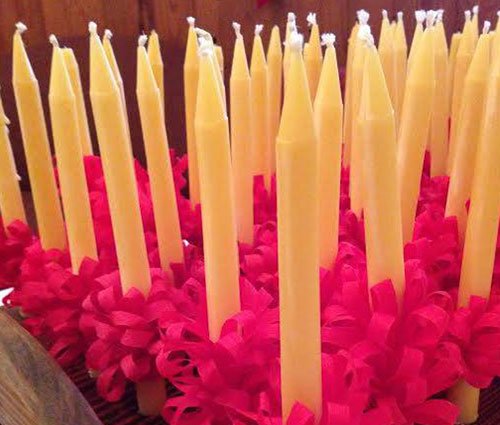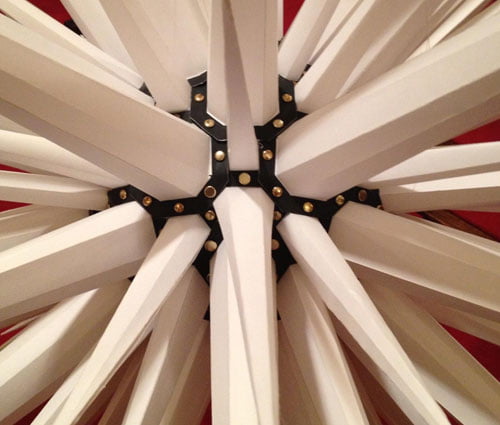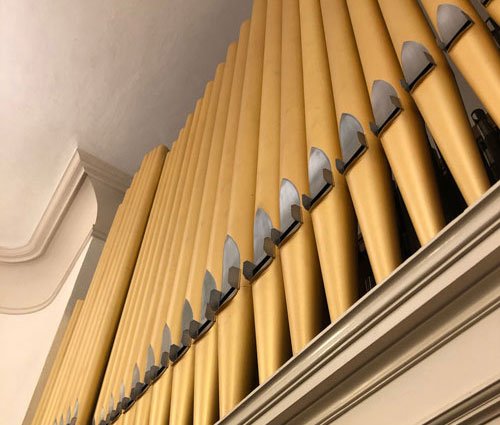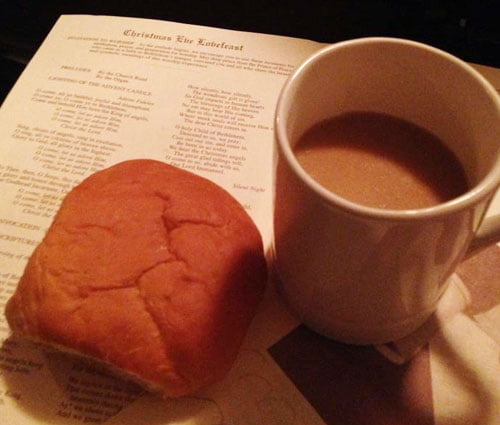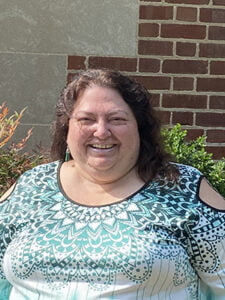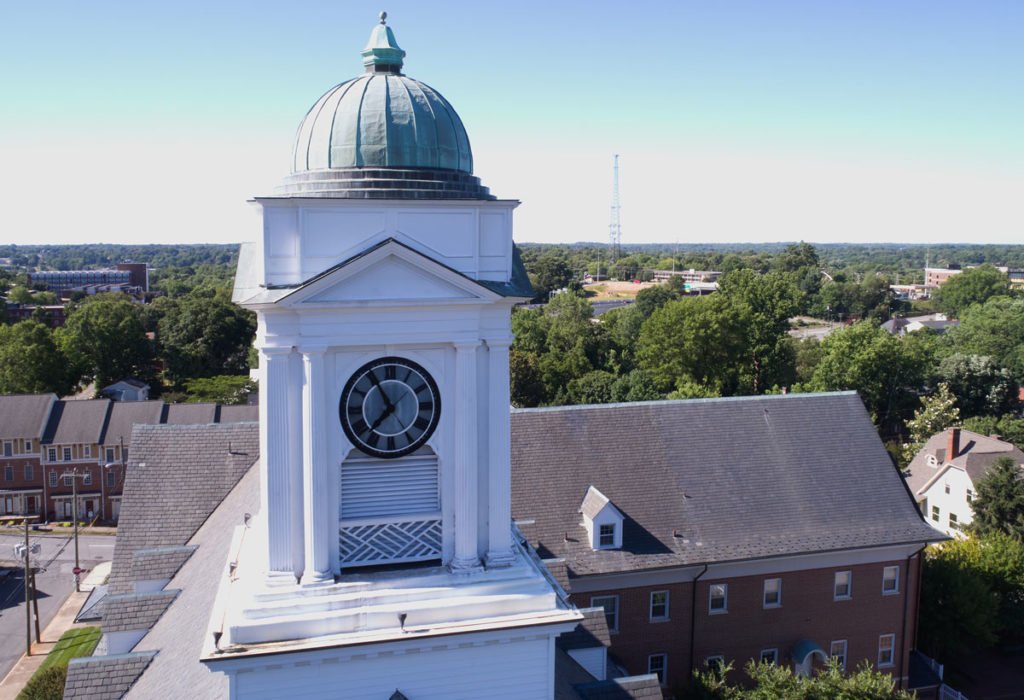Experience our
historic stained
glass windows.
Don't miss our
Christmas Eve
Lovefeasts!
Let your
light shine
bright here.
We are working on adding a new playscape to our campus!
Experience the sight
and sounds of our
Hook & Hastings organ.
Lovefeast bun and
coffee on Christmas Eve.
Come savor the
moment with us.
LIVESTREAM SERVICES
To livestream our Sunday services beginning at 11 a.m. every Sunday, click here. To watch previously recorded services, click here.
About Calvary Moravian
Calvary Moravian Church has been serving downtown Winston-Salem since 1893.
We are a faith community of families and individuals who share a common bond of love
for Jesus Christ, a fellowship of family and friends, a desire to serve our community, and
an appreciation for traditions – both old and new – of the Moravian Church.
STAFF
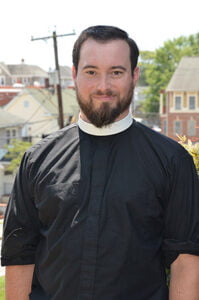 Chaz joined Calvary as Pastor in 2019. He grew up in Charlotte and received his B.A. in sociology and religious studies from Appalachian State University, his Masters of Divinity from Gordon-Conwell Theological Seminary, and his graduate certificate in Moravian Studies from Moravian Theological Seminary.
Chaz joined Calvary as Pastor in 2019. He grew up in Charlotte and received his B.A. in sociology and religious studies from Appalachian State University, his Masters of Divinity from Gordon-Conwell Theological Seminary, and his graduate certificate in Moravian Studies from Moravian Theological Seminary.
In his eight-year ministry, Chaz has served at Little Church on the Lane in Charlotte as director of youth and college ministries, at Covenant Presbyterian (also in Charlotte) as director of middle school ministry, at Harrison United Methodist (in Pineville) as director of youth ministry, and most recently at Ardmore Moravian as pastor.
In addition to serving on various Moravian committees, Chaz has served as vice-chairman of the Salem Congregation and was just elected chairman in January 2020, Chaz has three children: Christopher, Abby, and Sara.
If you would like to get in touch with Chaz, you can use the message feature on our “Connect” page, call the office at (336) 722-3703, or email him: chazsnider@nullcalvarymoravian.org.
If you would like to get in touch with Wayne, you can use the message feature on our “Connect” page, call the office at (336) 722-3703, or email him: wayne@nullcalvarymoravian.org.
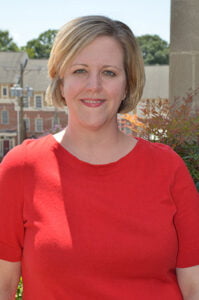 Originally from Kingsport, TN, Amanda completed undergraduate and graduate degrees in Voice Performance and Pedagogy from Westminster Choir College in Princeton, NJ, and a post-graduate degree in Opera Performance as part of the Fletcher Opera Institute from the University of North Carolina School of the Arts. Amanda is also the Director of UNCSA’s SummerVoice Intensive – a program designed to encourage and prepare middle and high school-aged students for a college career in voice.
Originally from Kingsport, TN, Amanda completed undergraduate and graduate degrees in Voice Performance and Pedagogy from Westminster Choir College in Princeton, NJ, and a post-graduate degree in Opera Performance as part of the Fletcher Opera Institute from the University of North Carolina School of the Arts. Amanda is also the Director of UNCSA’s SummerVoice Intensive – a program designed to encourage and prepare middle and high school-aged students for a college career in voice.
Amanda has enjoyed working, worshiping, and serving Calvary since 2009. She lives in Winston-Salem with her husband, Scott, and her favorite pup, Baxter.
If you would like to get in touch with Amanda, you can use the message feature on our “Connect” page, call the office at (336) 722-3703, or email her: amoody@nullcalvarymoravian.org.
Mary Lou earned her music degrees at Salem College and the Eastman School of Music, where she studied with Margaret and John Mueller, and Russell Sanders. She has performed numerous recitals in the United States and France, including a recital at St. Thomas Church Fifth Avenue in New York. Her performances have been heard on National Public Radio and on Alabama and North Carolina Public Radio. She was selected by internationally renowned organist Marie-Clair Alain to study privately with her in Paris for two years. During this time, she served as assistant organist/choirmaster for Susan Landale at St. George’s Anglican Church in Paris, as harpsichord accompanist for flute students of Jean-Pierre Rampal, and was nominated for the finals in the Chartres International Organ Competition.
For 20 years, Mary Lou and her husband, Wade, were Professors of Music at Judson College, where they received several awards for teaching excellence. Mary Lou comes from a long line of organists who have served the Bethania Moravian Church, including her great-great-grandfather, Eugene Christian Lehman. As a youth, her father Reverend John H. Kapp pumped the bellows for the 1774 Bulitschek Organ, then housed in Bethania Moravian Church.
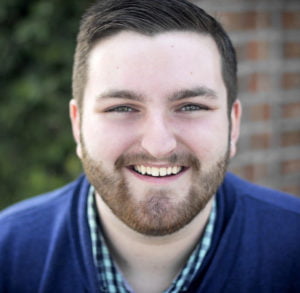
Jacob Patrick grew up in Central Florida and went to school at Florida State University in Tallahassee, FL for vocal performance. For several years after college, he was a full time classical singer, singing with various churches, Palm Beach Opera, and the Princeton Festival. After a hurricane displaced him from his Miami home, he decided to make a change and move to Winston-Salem. He has made his home here for 4 years now, working for Centenary United Methodist Church and the Arts Council Winston-Salem & Forsyth County as well as doing marketing consultation for various small businesses. He lives with his Border Collie, cats, and a rotation of foster animals through local rescues.
BELIEFS, HISTORY & SPACE
Moravians believe deeply in Jesus as Savior and Lord, but we do not seek to define every aspect of doctrine and faith. We teach the essentials of faith, leaving the nonessentials to the individual believer to discern as they grow in their own spiritual journey. We believe that the manner in which we live our lives is the most important testimony. Those who live a life of love and respect for others testify more clearly of God than those who only preach doctrines.
The informal motto of the Moravian Church is: In essentials, unity; in non-essentials, liberty; in all things, love. The Moravian Church emphasizes only those core values that are made clear in the Bible, especially those taught and lived by our Lord Jesus Christ, who we regard to be the highest and best revelation of the nature of God. Issues that are not made clear in the Bible, particularly those that have historically divided the Church, are left to the individual believer. For example, the Moravian Church is one of the only denominations that does not teach a specific understanding of communion; people of Roman Catholic, Lutheran, or Baptist backgrounds are welcome to meet at the Lord’s Table where each understanding of Communion will be respected.
It is not conformity to a particular interpretation of scripture that unites us; rather, it is Christ. Thus the Moravian Church does not focus so much on “right doctrine,” but rather on “right living.” Some of our basic beliefs are contained in a document known as The Ground of the Unity. Rather than signing on to a list of beliefs, members are asked to agree to a standard of life known as The Moravian Covenant for Christian Living. For more information, visit the web site of the Moravian Church in America.
Sunday Services
Worship Service (11:00 a.m.)
The congregation of Calvary gathers every Sunday at 11:00 a.m. Some attend in person while others join via Livestream. During the worship hour we have nursery care for our youngest children and Godly Play for lower elementary-age children. Calvary welcomes everyone in all stages of their faith journey to our church family.
Calvary celebrates the rich tradition of the liturgical church year, and our worship services are likewise liturgical. That is, we follow a traditional, written order of service that includes prayers, Bible verses, responsive readings, hymns, and a sermon or homily. Our hymns and liturgies typically come from the Moravian Book of Worship (hymnal), and singing is usually led by our choir and pipe organ, with occasional special guest musicians as well as special preservice music by a brass band comprised of our own members. Services usually last around an hour.
Helpful Info for Visitors
Calvary welcomes you just as you are. While some of our members and guests dress in suits and skirts, others come clad in jeans and sneakers. No matter what you prefer to wear, we just want you to feel comfortable.
Parking is always available behind our building and in our side driveway, as well as in the Bookmarks/Footnote parking lot. At this time parking is also permitted on Sundays in the small paid Garner lot adjacent to the Footnote lot, on Holly Avenue (free to church-goers on Sunday mornings only), and along the street immediately in front of our building. Handicap spaces are located on the street and in the rear lot, and the building is equipped with an elevator.
At this time, masking is optional on our campus. Masks are available upon request.
Our Address
600 Holly Avenue
Winston-Salem, NC 27101
Phone: 336.722.3703
Calvary Moravian Church has been in continuous service since 1889 when the “Calvary Chapel” opened. The church grew so much in the following years that the chapel was razed in 1926, and the sanctuary that stands today at the corner of Holly Avenue and Poplar Street in Winston-Salem. was built to hold 675 worshipers.
Calvary Moravian has long been noted for inspirational and creative worship, an outstanding music program, Sunday School for all ages, a caring fellowship, and varied opportunities of service to the congregation and the local community. In these ways, Calvary has responded to its call to faith in God through Jesus Christ.
Well into our second century of ministry, Calvary and its membership look forward to continuing in service to the Lord in a way that celebrates the past and is open to the leading of God’s Holy Spirit for the future. Our history reveals a deep desire to serve “the present age,” an “age” that is always before us.
The Moravian Church (officially the Unitas Fratrum, Unity of Brethren) is the oldest Protestant Church, predating Luther by 50 years. A hundred years before Luther, what would become the Reformation was already under way in the person of Jan Hus, a Catholic priest who called for major reform in the Roman Catholic Church. He was declared an arch-heretic at the Council of Constance, and was burned at the stake. His martyrdom began the Hussite Wars and several groups exploring faith independent of Rome. At the end of the Hussite Wars, one group of Hussites influenced by Petr Chelcicki (whose writings also inspired Gandhi and MLK) abandoned violence and built a town where they could follow the Beatitudes and the model of the early church. They published the first hymnals for congregational singing, translated the Bible into Czech, and by the mid-16th century numbered over a half million. John Amos Comenius, the “Father of Modern Education” was a bishop and president of the group when the Thirty Years War nearly destroyed the population in Moravia and Bohemia, and placed them under Roman Catholic rule. Many went underground.
In the early 1700s a remnant — the grandchildren of the last official Brethren — emigrated to Saxony and built the village of Herrnhut on the lands of a Lutheran noble, Count Nicholas Ludwig von Zinzendorf. After a terrible period of conflict, they all experienced a powerful experience of the Holy Spirit (the “Moravian Pentecost” in 1727) that brought them together as a true community — again trying to emulate the first century church. They felt called to mission (there were no organized Protestant missions at that point) and sent people all over the world to evangelize – particularly to the “last and the least,” slaves and natives, who were treated as equals. Moravians came to America not for religious freedom but to minister to the native Americans and settlers. They influenced the conversion of John & Charles Wesley, founded Bethlehem, PA and Salem, NC as central church communities that supported outlying mission communities. Moravians were the first to educate women in America at Salem Academy & College in North Carolina and Moravian Seminary for Women in Pennsylvania.
Today, most Moravians are in Africa and other mission fields. There are only about 35,000 in the US but over a million in Tanzania. The “Moravian principle,” which we share with other denominations, is “In essentials, unity, in non-essentials, liberty, in all things love.” We are the only mainline denomination that has never experienced a schism.
We encourage community organizations to contact us about using our available spaces for any number of events.
In addition to the sanctuary, Calvary Moravian has a three-level Christian Education wing that was erected on the west side of the building with over 6,000 square feet of classroom and office space on three levels, which is all handicap accessible via an elevator. We also have a basement fellowship hall which serves as a large meeting space and as a dining space, adjacent to our kitchen.
The Fellowship Center, a separate structure located behind our main building, contains a kitchen, bathrooms, meeting space, and pavilion. This center is used both by the church and the community.
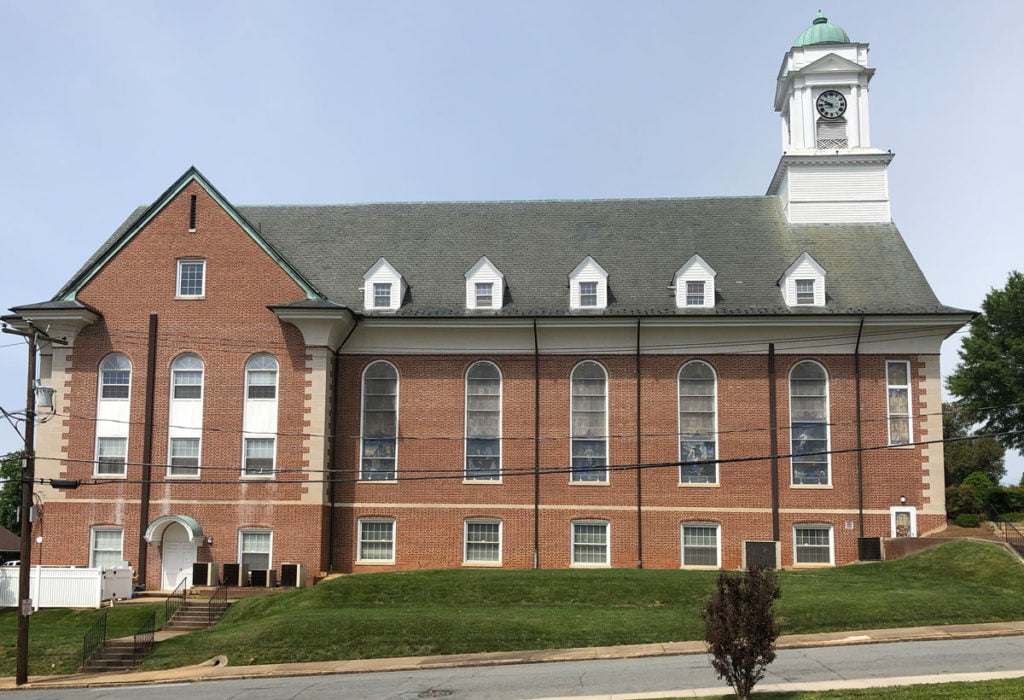
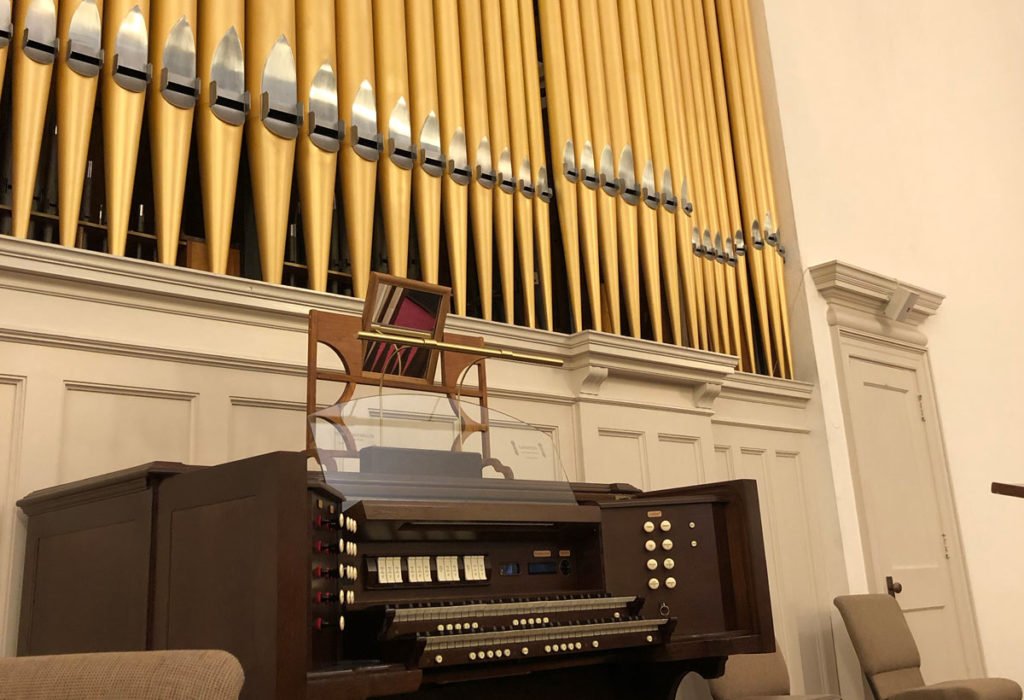
Calvary’s organ was built by the Hook and Hastings Co. of Boston, Massachusetts. The Opus Number 2510 is inscribed in various places inside the organ, including the following: “organ installed March 18, 1926, W.C. Greenwood, J.B. Wilson.”
The organ is the only specimen of its type surviving in this area. It is part of the original equipment of the building and was unaltered until 1983 when it was “conservatively modernized.” The organ was refurbished again in 2019.
The clock tower was added to the church when it was re-built in 1926. This clock, which is still working today, had a previous life atop the original Winston-Salem City Hall that stood where the R.J. Reynolds building is today. Until 1972 when the clock was electrified, this Seth Thomas original was hand-wound every Friday.
Calvary’s bells are another unique feature of our sanctuary. A rope in the attic rings the larger bell manually. It was cast in 1892, and the smaller bell attached to the clock was cast in 1890.
Our pastor will be glad to discuss this with you. An appointment can be made to visit your home or you may make an appointment with Pastor Chaz at the church. Please click here to call church or call 336-722-3703 and schedule a time to speak with Pastor Chaz.
There are four ways to become a member of our congregation:
- By baptism as a child, and confirmation of faith in later years.
- By baptism as an adult. This is for persons not baptized as children, who profess faith in Jesus Christ as Lord, and who desire to become members of the church.
- By Reaffirmation of Faith. This is for persons who have previously confirmed their faith (by confirmation or adult baptism) but who have not been active members of a congregation for some time.
- By transfer of membership from another Moravian or Christian Church by persons reaffirming their faith. This is particularly for persons in good standing of another congregation who wish to change their membership. A letter of transfer, or similar commendation, is required from the former congregation.
